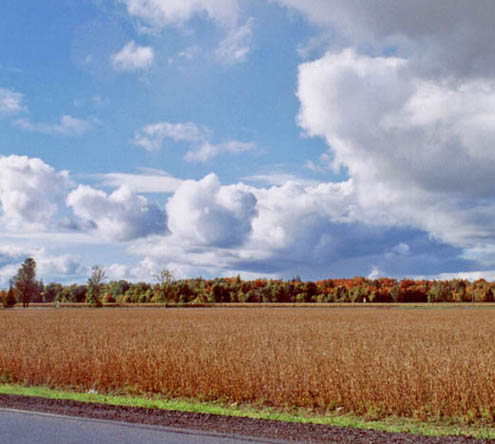Can McGuinty government’s public finance in troubled times work?
Mar 26th, 2010 | By Randall White | Category: In Brief
Ontario vacation promotion booklet 1947 ... when the global village was a very different place than it is today, financially and in many other ways too.
It is not easy to know just what to make of the world of public finance these days. And the 2010 Ontario Budget introduced on March 25 doesn’t help all that much.
On March 23 one of the deans of the Ottawa press corps, Jeffrey Simpson, published an article in the Globe and Mail, provocatively headlined “Ontario’s budget will just delay the pain … The province is in an immense fiscal hole with absolutely no idea how to climb out of it.” But the 2010 Ontario Budget does have a “Plan to Eliminate the Deficit” – by the 2017—18 fiscal year. (We have just finished the 2009—10 year, and the 2010 budget is for the 2010—11 year. And, btw, the actual 2009—10 deficit turns out to be only $21.3 billion, not the $24.7 billion estimated last fall – still quite enormous, but not quite as enormous etc, etc.)
Of course any “plan” for as long as the next eight years is bound to be based on assumptions – and in this case especially assumptions about increasing future economic growth – that may or may not prove correct. And then again, you might ask, why not eliminate the deficit sooner?
The theory here (as with the recent federal budget in Canada, in some respects at least) seems to be that some degree of economic recovery is underway. And to introduce too much of the kind of pain that will be required to eliminate the deficit too quickly will just make things worse. At the same time, the current Keynesian mood in public finance (ie public-spend your way out of economic downturns) is apparently rather transient. Ontario’s financial managers agree that some pain must lie ahead. And the 2010 budget makes a start on dishing this out.

House for sale in St. Thomas, in Southwestern Ontario – part of the old Grit heartland that may not be so important in the age of Dalton McGuinty?.
Steps are already afoot to “to reduce the size” of the Ontario Public Service (OPS) “ by five per cent by March 31, 2012 through attrition and other measures.” The “government will also introduce legislation that would freeze compensation structures in the broader public sector and the OPS for two years for all non-bargained employees.” The government has similarly begun “Slowing the Pace of Long-Term Infrastructure Investments.” (Which, among other things, will defer some planned Toronto region transit improvements – though not apparently the o-so-long-in-coming link between the Pearson airport and the Toronto downtown.)
The government is making as well some as yet rather vague gestures in the direction of managing health care expenditures more economically: “Today, health sector spending accounts for about 46 cents of every program dollar [up from 32 cents 20 years ago]. If left unchecked, cost drivers could push health care spending to 70 cents of every program dollar in 12 years. The Province will continue to face challenges in managing the growth in health care spending without crowding out other priorities such as investing in schools, helping the vulnerable, protecting the environment, and investing in infrastructure and economic development.” (For a start, there is apparently a continuing intention, broadly speaking and down the road not too far at any rate, to limit future health care spending increases to an annual rate of 3%, [albeit as already alluded to in previous budgets].)

Killarney Provincial Park in the Northern Ontario slated for at least some extra attention in the 2010 provincial budget.
At the same time again, the Ontario government is still going to be spending some money to try to boost the already recovering regional economy – or if you like, within a framework of enhanced fiscal restraint (as above, eg, + limiting overall spending increases “from 2012” to 1.9% annually) it will continue “investing in schools, helping the vulnerable, protecting the environment, and investing in infrastructure and economic development.” You can get some sense of what this is all about by looking at the half a dozen key 2010 “Highlights” headings for “Ontario’s Plan for Prosperity … Jobs and Growth”: “Investing in Knowledge and Skills” ; “Helping Job Creation and Economic Growth in Northern Ontario” ; “Job Opportunities through the Green Economy” ; “Short-Term Infrastructure Investments” ; “Ontario’s Tax Plan for Jobs and Growth” ; and “Advancing the Poverty Reduction Agenda.”
Can this McGuinty Liberal government middle-of-the-road (or “blue-grit,” or even “progressive-conservative”?) approach to the public finances of Canada’s most populous province actually work in the challenging economic circumstances of the 21st century’s second decade? Both the opposition Conservatives on the right and New Democrats on the left will say no, of course.

The new Michael Lee-Chin Crystal addition to the Royal Ontario Museum in Toronto, just north of Queen’s Park where Ontario Budgets are introduced.
Some of Jeffrey Simpson’s concern that maybe it can’t seems to flow from his recent study of a report on current US state government finances by “the Center on Budget and Policy Priorities, a liberal think tank.” As Mr. Simpson puts it: “In the US, the ideological ferocity with which many Americans respond to even a hint of a personal or sales tax increase forces governments to deal with deficits almost entirely by spending cuts … In Canada, provinces cut a little but mostly borrow and raise taxes in a fiscal pinch; in the US, states mostly cut. We delay pain, hoping things will improve; they inflict it now.”
Especially for what was once (in the 1930s, eg) known as “the most British of all the provinces,” an at least slightly different slant on the broader picture is offered by John Lanchester’s article “The Great British Economy Disaster” in the March 11 issue of the London Review of Books. Mr. Lanchester’s conclusion about the upcoming British election (which the Conservatives may not now actually win, apparently) is: “whatever the political hue of the new government, it has to walk a fiscal tightrope. It is probably going to be a very good election to lose … At the moment, thanks to the subjective mildness of the recession, we are still in denial.”

Farmer’s field in Eastern Ontario – one part of the heartland of the old Tory dynasty that dominated Ontario politics, 1943—1985, and may not be too sure just where it’s going right now?
What the 2010 Ontario Budget seems most in denial about is the ultimate need to raise taxes, in some degree at any rate, if its middle-of-the-road approach to current public finance is going to succeed in the end. It is still talking about: “Personal Income Tax cuts for 93 per cent of income tax payers” ; “Enhanced sales tax credits and property tax credits for low-to middle-income families and individuals, starting in 2010; “Corporate Income Tax cuts, including reducing the small business income tax rate from 5.5 per cent to 4.5 per cent on July 1, 2010” ;.”Over $4.2 billion in Sales Tax Transition Benefits to help Ontarians adjust to the Harmonized Sales Tax.”
This is no doubt all good politics right now. But at some point soon enough it just may be that (even in the United States?) someone is going to have to start paying attention to what Ronald Reagan’s former budget director David Stockman was saying on US public television, just a month or so ago: “I think the lesson of the last 25 years is that it doesn’t work …Â Taxes are going to have to be raised. … Sorry … game over. We’re now in the tax-raising business. And we’re going to be in the tax-raising business for the next decade.”
[UPDATE: For his part, as of today, March 26, Jeffrey Simpson is urging: “Ontario lifted Canada up. Now it’ll drag it down … The Ontario budget: why the math should not be believed.”

Niagara Falls, Ontario at night – right next door to Niagara Falls, New York. Once upon a time New York was the most populous state of the union. Then California surged ahead, and now even Texas has more people. But it will still be quite a long time before any other Canadian province has more people than Ontario – as Dalton McGuinty keeps trying to remind the rest of Canada.
Some might say that at least some of this is just sour grapes. Finance minister Dwight Duncan and Premier Dalton McGuinty have shown how Mr. Simpson’s earlier argument that “The province is in an immense fiscal hole with absolutely no idea how to climb out of it” was a bit, well exaggerated, or something like that.
(“Absolutely no idea,” at any rate, is not quite right.)
On the other hand, Mr. Simpson’s scepticism about some of the 2010 budget numbers is not entirely wild and crazy. They probably do altogether make sense only on the assumption that there are in fact going to be some significant enough tax increases, after the next fixed-date provincial election in October 2011 – if only the economic reality will wait that long?]

